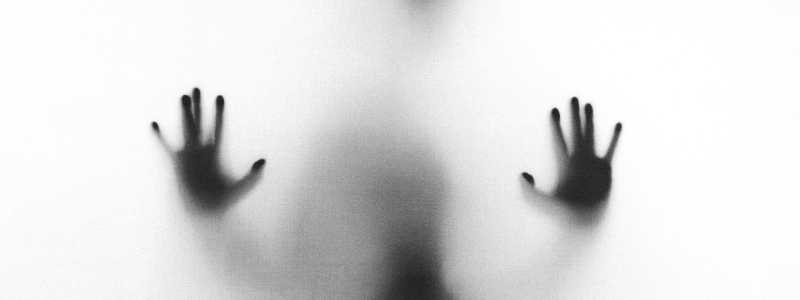Horror as a genre of ‘entertainment’ has, I would suggest, always been a part of the human experience, as it is through this collective narrative that we give shape and form to a world in which we have very little control. Long before movies existed and extending back to before the written word, our early ancestors would ‘invent’ super-natural beings with whom they would do battle in story and ritual. Why?
Anxiety
Human beings are inherently anxious beings. One can argue that this anxiety has come about as a result of two facts: the first being that until very recently we had good reason to be anxious as much of nature and the animals and plants in it posed an existential threat to us – only the anxious survived.
Secondly, and perhaps more psychologically relevant, is the suggestion that humans are the only animal who is conscious, self conscious, hyper conscious. What fundamentally makes us stand out from other animals is our ability to project our minds into the future which renders us capable of planning and achieving great feats, however, also brings us into brutal contact with the knowledge that we are destined to die. We are therefore in the impossible position of being able to largely shape our destiny (providing we don’t get eaten by a wild animal) only to face a certain death at the end of life (if we are lucky), or potentially at any moment. This renders us anxious in nature.
Humans use all sorts of methods and means as individuals and in groups to manage their underlying anxiety such as having children and building a career, through to subscribing to a culture (being British), that provides constituents with shared answers to cosmological questions – where have I come from, what happens after I die? So how may this apply to horror?
It has been noted that more than half the population enjoys watching horror as a genre. What is specific to this group is that they tend to score high on neuroticism which, amongst other characteristics, is denoted by high levels of anxiety.
When we think of anxiety as being the price we pay for our consciousness, and we consider that humans are always trying to somehow manage their anxiety, the draw to horror movies becomes a little clearer, particularly when considered in conjunction with the events of the past couple of years.
Why are we collectively watching more horror movies?
As a collective global society, any notions of safety and security were suddenly taken from us in early 2020 by the emergence of a virus that swept the world. We were all required to remain at home, stay away from work and consider friends and loved ones as ‘high risk’ and potentially contagious. For our nervous systems this represents a horror movie in itself! The problem is that it unfolded far too slowly for us to ‘attach’ our anxiety to it and then let it play out over 90 minutes.
Watching horror as a locus of control
I would suggest that one of the prime reasons that horror has become so popular over the last couple of years is that it represents a vehicle onto which those who already have a disposition to using horror as a means of evacuating their anxiety through projection, to do so by ‘projecting’ the anxiety of the unknowns generated by the fallout of the pandemic, into something tangible – a movie.
Psychologically horror movies may also function in a pseudo-ritualistic manner, in the way a dance or group ritual may have worked for our ancestors to gain mastery over their world – even if only in fantasy. The themes in horror movies are primal and archetypal in nature – they represent what lurks in the deepest recesses of our minds – and what we once imagined lived behind every tree out in darkness as we cowered by our campfires with mere sticks and stones to protect us.
Horror movies represent the ultimate battle of good versus evil and as it is a battle that plays out on screen we feel activated in the way our ancestors did when facing real and imagined dangers, however, it provides a locus of control to the viewer in that they are choosing to feel anxious and embark on the quest they experience playing out in front of them.
I therefore do not believe that horror films represent a conscious desire on the viewers part to confront their fears about the real world ‘head on’ but rather that it is a displacement activity whereby anxiety can be expelled in a socially sanctioned and safe manner. It is a method and means of gaining mastery over unbearable feelings through experiencing them safely.
Life imitates art, as the expression goes, however art is first and foremost an expression of the collective experience (the collective unconscious), and so as long as our collective experience is dominated by the horror of the pandemic and war and other existential threats, then I think it likely that horror, as a genre of art, will continue to be made and consumed at a higher rate as a way of us coping with our anxiety.
Mark Vahrmeyer, UKCP Registered, BHP Co-founder is an integrative psychotherapist with a wide range of clinical experience from both the public and private sectors. He currently sees both individuals and couples, primarily for ongoing psychotherapy. Mark is available at the Lewes and Brighton & Hove Practices.
Further reading by Mark Vahrmeyer
Can couples counselling fix a relationship?
